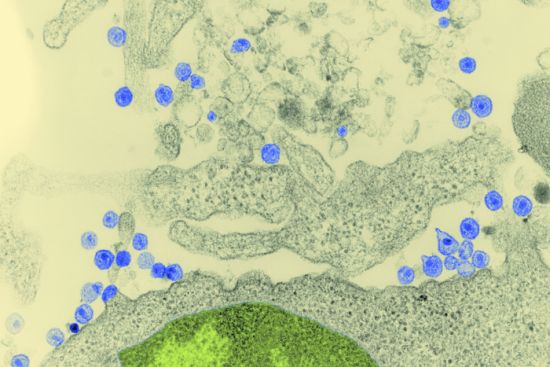17-MAY-2023
40 years after the discovery of HIV
From virus identification to hopes of a cure, what are the new challenges for research?
INSTITUT PASTEUR

Caption: One of the very first photographs of the HIV-1 virus (colorized blue) taken on February 4, 1983.
CREDIT: © Institut Pasteur/Charles Dauguet
Research on the HIV/AIDS epidemic – which continues to be a major public health issue, with 1.5 million new infections worldwide in 2020 (1) – is now a 40-year-long tradition at the Institut Pasteur. The story began when the HIV retrovirus was identified in 1983, and continued with the award of the 2008 Nobel Prize in Physiology or Medicine to Françoise Barré-Sinoussi and Luc Montagnier for this discovery. Another milestone was the sequencing of HIV-1 in 1985, then HIV-2 a few years later, which would pave the way for different therapeutic approaches. The sequencing of reverse transcriptase, a crucial enzyme for viral replication, led to the first antiretroviral drug, AZT, in 1987.
Today, 40 years after the identification of HIV, a wealth of knowledge has been accumulated on its mechanism of action, the way in which it attacks immune cells and effectively spreads from one cell to the next, and also the ability of some people living with HIV to mount an effective defense. An international scientific conference set to take place at the Institut Pasteur from November 29 to December 1, 2023, will take stock of the latest advances in research.
But two scientific problems remain unanswered: how can we develop an effective vaccine against HIV, and how can we eliminate the persistent viral reservoir in people living with the virus? Several research teams at the Institut Pasteur and in the international Pasteur Network are working on the latter issue, and clinical trials will begin in 2023 to test novel broadly neutralizing antibodies and promising natural killer cells.
In a context dominated by the recent COVID-19 pandemic, and more recently by the monkeypox epidemic, it is more important than ever that we pool our research efforts. The knowledge accumulated on HIV, especially diagnostic tools and techniques for analyzing and producing broadly neutralizing antibodies, proved useful in tackling SARS-CoV-2 and monkeypox. We now have to hope that the knowledge gained about these novel viruses can help us solve the mystery of viral reservoirs so that we can offer lasting remission or even a cure for HIV infection.
Christophe d'Enfert, Senior Executive Scientific Vice-President of the Institut Pasteur
(1) UNAIDS.
Contact
Myriam Rebeyrotte
Service de Presse - Press Office
Institut Pasteur
25-28 rue du docteur Roux
75724 Paris cedex 15
tel : + 33 (0)1 45 68 81 01
www.pasteur.fr
www.pasteurdon.fr
Source: https://www.eurekalert.org/news-releases/989574
"Reproduced with permission - Institut Pasteur"
Institut Pasteur
For more HIV and AIDS News visit...
Positively Positive - Living with HIV/AIDS:
HIV/AIDS News |